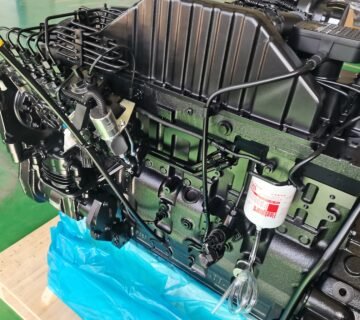The Ultimate Guide to Choosing the Best Lubricants for Cummins Diesel Engines
For over a century, Cummins diesel engines have set the benchmark for power, durability, and efficiency in industries ranging from heavy-duty trucking to military operations. But even the most robust engines require the right lubrication to perform optimally. Selecting the best oil for Cummins diesel engines isn’t just about protecting components—it’s about maximizing longevity, fuel efficiency, and reliability under extreme conditions. This guide explores the science behind lubricant selection, top-recommended products, and maintenance strategies to keep your Cummins engine running like new.

Why Oil Choice Matters for Cummins Engines
Cummins engines are engineered to deliver high torque, fuel efficiency, and rugged dependability, but these qualities hinge on proper lubrication. The right oil reduces friction, dissipates heat, and prevents wear on critical components like turbochargers, pistons, and cylinder liners. Poor-quality lubricants, by contrast, can lead to sludge buildup, accelerated wear, and even catastrophic engine failure.
Key factors influencing oil performance in Cummins engines include:
- Viscosity: Determines flow characteristics in cold starts and high-temperature operation.
- Additive Technology: Combats soot, oxidation, and acidic byproducts from combustion.
- Compatibility: Must meet Cummins’ specifications (e.g., CES 20081) and modern emissions systems like DPFs and EGRs.
Top-Recommended Oils for Cummins Diesel Engines
Based on rigorous testing and manufacturer endorsements, these lubricants stand out for their performance in Cummins engines:
- Valvoline Premium Blue Extreme 5W-40
Cummins’ official recommendation, this full synthetic oil is formulated with dispersive polymer technology (DPT) to control soot and prevent deposits in engines with exhaust aftertreatment systems. It meets CK-4 specifications, offering extended drain intervals up to 60,000 km (37,000 miles) in severe conditions.
– Benefits: Enhanced cold-start protection, high-temperature stability, and compatibility with biodiesel blends.
– Ideal For: Modern Cummins engines in trucks, generators, and industrial equipment.
- Shell Rotella T6 Full Synthetic 5W-40
A favorite among diesel enthusiasts, Shell Rotella T6 excels in extreme temperatures and heavy-duty applications. Its triple protection formula resists oxidation, reduces wear, and improves fuel efficiency by up to 3%.
– Benefits: Superior shear stability for turbocharged engines and extended oil change intervals.
– Ideal For: High-mileage Cummins engines in towing or off-road scenarios.
- AMSOIL Signature Series Max-Duty 5W-40
This synthetic oil boasts a high total base number (TBN) to neutralize acids and combat soot accumulation. AMSOIL’s advanced additives enable drain intervals up to 25,000 miles under normal driving conditions.
– Benefits: Exceptional protection for engines operating in dusty or high-load environments.
– Ideal For: Fleet operators and long-haul trucking.
- Mobil 1 Turbo Diesel Truck 5W-40
Engineered for modern diesel engines, Mobil 1’s synthetic formula safeguards turbochargers and reduces carbon deposits. It meets API CK-4 and Cummins CES 20081 standards, ensuring compatibility with DPFs and EGR systems.
– Benefits: Improved cold-cranking performance and reduced oil consumption.
– Ideal For: Cold climates and urban driving cycles.
How to Choose the Right Oil for Your Cummins Engine
- Prioritize Viscosity Based on Climate
– 5W-40: Ideal for year-round use, offering superior flow in temperatures as low as -30°F and protection up to 100°F.
– 15W-40: Better suited for warmer climates or engines operating consistently above freezing.
– 10W-30: Recommended for post-2019 Cummins engines, balancing fuel efficiency and cold-start performance.
- Verify API and OEM Certifications
Always select oils meeting API CK-4 or CJ-4 standards, which are optimized for modern diesel engines with emissions controls. Cummins-specific approvals like CES 20081 ensure compatibility with advanced fuel systems and aftertreatment components.
- Synthetic vs. Conventional Oil
– Synthetic Oils: Provide better thermal stability, longer drain intervals, and enhanced protection in extreme temperatures. Essential for engines subjected to heavy towing, frequent idling, or cold starts.
– Conventional Oils: A cost-effective option for older engines under moderate loads, but require more frequent changes.
- Monitor Oil Change Intervals
– Pre-2013 Models: Change oil every 7,500 miles or 6 months.
– Post-2013 Models: Extend intervals to 15,000 miles with synthetic oils, but reduce to 5,000–7,500 miles for severe duty (e.g., towing, dusty environments).
Proactive Maintenance Tips for Peak Performance
- Use Genuine Filters: Pair high-quality oil with OEM-approved filters to prevent contaminants from bypassing the system.
- Leverage Telematics: Cummins’ ADEPT™ system predicts maintenance needs by monitoring oil condition in real time.
- Add Fuel Treatments: Cummins endorses Power Service Diesel Kleen +Cetane Boost to enhance lubricity, prevent gelling, and clean injectors.
Future-Forward Lubrication Trends
Cummins is pioneering low-ash formulations and bio-based lubricants to meet stricter emissions regulations. Hybrid and hydrogen-powered engines will also demand oils with enhanced thermal management and compatibility with electric drivetrains.

Conclusion: Trust the Best for Your Cummins Engine
Choosing the right lubricant for your Cummins diesel engine isn’t just about compliance—it’s about safeguarding your investment. By prioritizing CK-4 synthetic oils, adhering to viscosity guidelines, and leveraging Cummins-approved additives, you ensure maximum uptime, fuel efficiency, and longevity. Whether you’re powering a fleet of heavy-duty trucks or a standby generator, the right oil transforms your engine from a workhorse into a powerhouse.





No comment